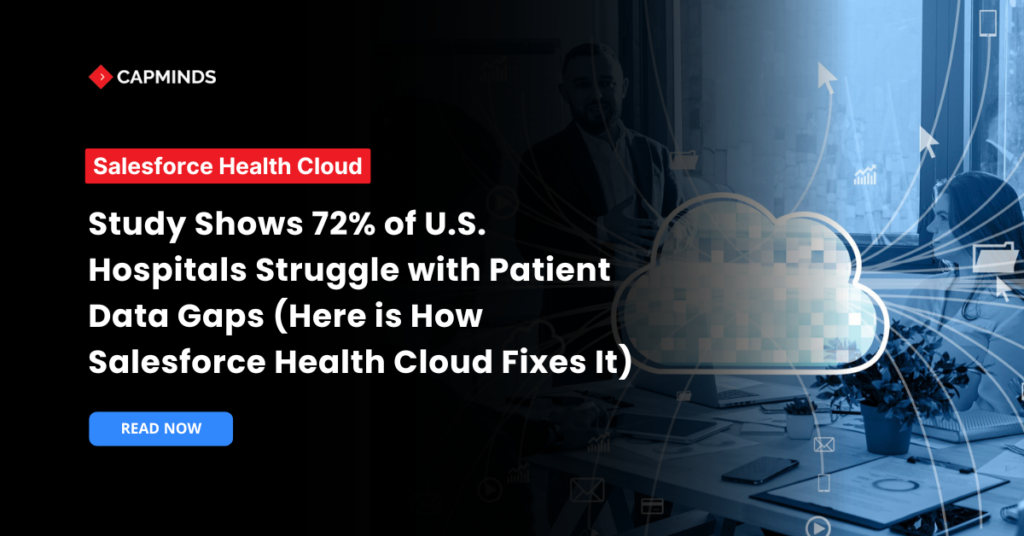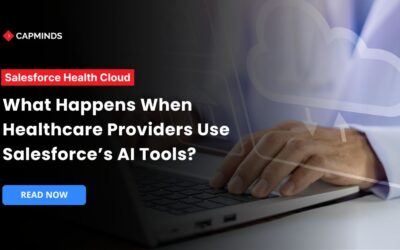Study Shows 72% of U.S. Hospitals Struggle with Patient Data Gaps (Here is How Salesforce Health Cloud Fixes It)
Physicians used to make life-or-death decisions based on incomplete patient information, but this has become more common in most US hospitals. According to research, 72% of hospitals have information gaps for their patients. This results in inefficiencies, misdiagnoses, and delayed therapies.
In an industry where every second counts, information gaps and outdated technologies might make the difference between a successful recovery and a costly setback. So, why is this happening, and how can technology, especially Salesforce Health Cloud, be the solution?
In this blog article, we highlighted how patient data gaps affect healthcare and how Salesforce Health Cloud is changing how hospitals handle patient information.
What Are Patient Data Gaps and Their Impact on Healthcare Decision-Making
Patient data gaps are where essential health information is missing or incomplete in patient records. For instance:
- A patient with a chronic illness visits a new specialist, but their medical history isn’t available. This can lead to repeated tests or incorrect treatments.
- The hospital ER admits a patient. but due to system limitations, the doctors can’t access past diagnoses which will delay care.
- Misfiled lab reports result in a physician making a treatment decision based on incomplete or outdated information.
These gaps in patient data not only create inefficiency. But also puts patient lives at risk. Without a complete, real-time view of a patient’s medical history, healthcare providers struggle to deliver safe and effective care for patients.
Key Causes of Patient Data Gaps
Despite advances in digital health, data gaps always remain one of the biggest barriers to seamless healthcare delivery. There are a few aspects like lack of interoperability among EHR systems, manual data entry errors, and delayed data sharing between departments can cause patient data gaps.
1. Lack of Interoperability Among EHR Systems
- The health care system is comprised of multiple Electronic Health Record systems that frequently operate in isolation.
- This fragmentation limits the consolidation of patient information and results in incomplete records.
- As a result, healthcare personnel may overlook critical facts during clinical assessments, increasing the risk of unnecessary testing and inadequate treatment strategies.
Related: 8 Simple Step Process to Integrate Salesforce Health Cloud with Any EHR
2. Manual Data Entry Errors
- If a healthcare provider relies heavily on manual data entry, there is a risk of human mistakes, such as omissions or inaccuracies.
- These mistakes can result in critical information being overlooked or misrepresented in patient records.
- This will hurt clinical decisions and patient outcomes.
3. Delayed Data Sharing Between Departments
- Timely data exchange across departments is critical for coordinated patient care.
- Delays in transmitting patient information might result in treatment deferral, confusion, and fragmented care.
- Ultimately, this compromises patient health outcomes.
The Impact of Patient Data Gaps in U.S. Healthcare Hospitals
The impact of fragmented data isn’t just an inconvenience, it can directly affect patient health outcomes. Moreover, there are other consequences of patient data gaps.
1. Medical Errors and Misdiagnoses
Incomplete medical records can lead to:
- Wrong treatments due to missing allergy or medication history.
- Misdiagnoses when previous test results aren’t accessible.
- Inappropriate prescriptions when doctors don’t have full medication histories.
2. Delayed Treatments and Poor Patient Outcomes
If a specialist doesn’t have real-time access to a patient’s data, treatment gets delayed. This will lead to:
- Prolonged hospital stays and worsening conditions.
- Unnecessary tests that add costs and stress for patients.
- Critical procedures were postponed due to missing lab reports.
3. Increased Administrative Workload
Providers and staff members should focus mainly on patient care. Instead, they used to spend hours reconciling incomplete records or tracking down the missing lab results. Yet, many healthcare workers face burnout due to excessive administrative tasks related to data management failures.
4. Financial Losses for Healthcare Institutions
Healthcare Practices and organizations often lose millions every year due to the:
- Duplicate tests and procedures from inaccessible records.
- Lawsuits and penalties due to compliance failures.
- Longer patient stays caused by treatment delays.
How Salesforce Health Cloud Fixes Patient Data Gaps
What is Salesforce Health Cloud?
Salesforce Health Cloud is a customer relationship management (CRM) software built for healthcare. It allows healthcare organizations to manage patient-provider relationships and other areas of care coordination, while also providing patients with more personalized health experiences.
This includes the capacity to communicate with other health IT systems, such as electronic health records. Interfacing with EHR, health practitioners will most likely have access to an integrated view of patients’ health information, as well as clinical and non-clinical data.
Salesforce Health Cloud provides a comprehensive solution for:
- Managing Patient Information
- Ensure secure communication among healthcare workers.
- Support data-driven decision-making.
- It connects healthcare records to patient management by interacting with EHR systems.
Related: The Ultimate Guide to Salesforce Health Cloud Implementation for Healthcare Providers
Key Features of Salesforce Health Cloud That Solve Data Gaps
Salesforce Health Cloud system has various features. But when it comes to solving patient data gaps, the salesforce health cloud system offers:
- Unified Patient Profiles: A single patient view is one of the most useful features of Salesforce Health Cloud. Salesforce’s health cloud gathers patient data from a variety of sources, including EHRs, laboratories, medical histories, communication logs, and more. The Salesforce health cloud solution gives clinicians a 360-degree picture of patient information by aggregating data from many platforms.
- AI-Powered Insights and Analytics: Salesforce Health Cloud includes the Einstein AI tool, which gives predicted insights and actionable analytics. It allows physicians to identify at-risk patients, optimize resource allocation, and tailor care regimens using data-driven suggestions.
- Real-Time Data Sharing & Interoperability: Salesforce Health Cloud software seamlessly connects various healthcare systems from various departments like primary care providers and specialists for real-time data sharing. This will eliminate the need for manual record transfer.
Related: Top 7 Features of Salesforce Health Cloud You Should Know
Benefits of Implementing Salesforce Health Cloud in Hospitals
1. Enhanced Accuracy in Diagnosis and Treatment
Healthcare professionals can reduce diagnostic errors and treatment errors by keeping patient records full and up to date.
2. Reduced Readmission Rates Through Predictive Care
Health Cloud enables proactive healthcare by analyzing patient trends and identifying risks before complications arise. This will significantly reduce preventable hospital readmissions.
3. Automated Workflows Reduce Administrative Work
Health Cloud can help with patient scheduling, paperwork, and communication. By streamlining administrative tasks, clinicians can devote more time to patients rather than paperwork.
4. Cost Savings from Eliminating Data Redundancies
By eliminating unnecessary testing, inefficiencies, and compliance concerns, US hospitals can save millions of dollars each year while improving patient outcomes.
Salesforce Health Cloud Solution From CapMinds
CapMinds offers a tailored Salesforce Health Cloud solution to address the unique needs of healthcare organizations, ensuring streamlined workflows, improved patient outcomes, and operational efficiency.
With CapMinds, healthcare providers can overcome the complexities of Salesforce Health Cloud and unlock its full potential through:
- We adopt Salesforce Health Cloud to your organization’s specific needs, enhancing functionality and usability.
- CapMinds ensures smooth integration with third-party systems like EHRs, billing systems, and patient engagement tools.
- Our hands-on training empowers your care teams to maximize the potential of Salesforce Health Cloud.
- We provide continuous updates, performance optimization, and issue resolution to keep your systems running efficiently.
- Ensure accurate and secure patient data migration with CapMinds’ expert-led processes.
Why Choose CapMinds?
CapMinds addresses the common challenges of Salesforce Health Cloud, such as bulk data performance issues, extensive customization needs, and integration complexities.
By leveraging pre-configured templates, scalable frameworks, and advanced integration tools, we simplify implementation and customization, ensuring a hassle-free experience for healthcare organizations.
Contact CapMinds to discover how our Salesforce Health Cloud solution can drive efficiency, improve patient care, and help your organization achieve its healthcare goals.
Let us guide you to a seamless care management experience.



